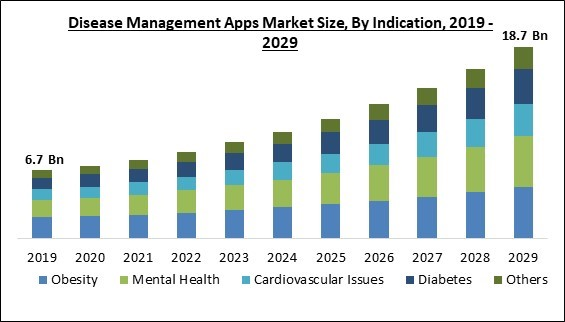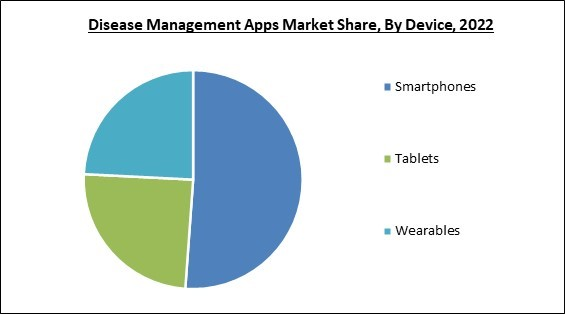Disease management apps incorporate exchanging and monitoring health information through mobile technology, like health tracking applications and wearable technologies. By using mobile wireless technology to give care and monitor symptoms, medical personnel can make diagnoses that are both easier and more efficient while reducing the number of errors. Customers are becoming increasingly interested in disease management apps as Apple and Google stock their app stores with various health-related applications.
An important element contributing to the expansion of the market is the growing use of applications like these. These apps make it possible to record data linked to one's health, manage chronic illnesses, receive online consultations, and do a few other things. Smartphones, desktops, and personal computers can all run disease management applications that provide users with various health-related services. Patients can use these applications even when they are at home.
The shift toward mobile health services in health care is partly facilitated by the proliferation of health applications. These applications offer a wide variety of helpful features for mobile health technology. Apps for healthcare allow patients faster access to physicians and treatment, enhance medication adherence, make it possible and easier to monitor remote patients remotely, raise the accuracy of medication reconciliation, which improves patient safety, and improves provider coordination and communication.
Applications for disease management that can assist users in monitoring their health concerns, like diabetes, pregnancy, heart disease, mental health, and many more, are useful health applications. Apps for general health and well-being, such as those that track diet and help count just calories, apps for sleep that track sleep patterns, and apps for stress management that help people quiet their minds.
COVID-19 Impact Analysis
Due to the COVID-19 pandemic's huge number of downloads in 2020, disease management app use increased. In addition, the industry gained speed as a result of government initiatives to promote self-monitoring applications, a tendency toward preventative healthcare, rising demand for telemedicine, as well as increased product launches by mHealth businesses. Due to rising consumer demand for smart applications and wearables, remote patient monitoring, and technical improvements, the market will continue to provide a variety of lucrative prospects. Therefore, the pandemic had a positive impact on the market.Market Growth Factors
Expanding use of 4G and 5G networks to maintain healthcare services
Better picture quality, less image distortion for video chats, and faster data transfer than those provided by 4G networks are all possible with 5G networks, which provide an improved user experience. In the future, the healthcare sector will profit from the advancement of Wi-Fi and Bluetooth technologies as they enable a larger penetration of networked medical devices, opening new prospects for digital disease management. Therefore, the advancements in the 4G/5G networks are propelling the demand for numerous disease management apps and, thus, the market's growth.Rising demand for and usage of wearable devices
In particular, monitoring of weight and physical activity is significantly assisted by digital solutions like health apps. Wearable IoT devices are also designed for illness prevention and health maintenance. With the use of these devices, doctors and other healthcare professionals may manage patients' or diseases' progression promptly. They can also have a direct impact on clinical judgment. As a result, wearable technology is frequently used in the healthcare sector to increase patient safety. The market for disease management apps is expected to grow due to the increased use of wearable technology.Market Restraining Factors
Limited guidance from healthcare providers and physicians
The delivery of mHealth services and disease management apps may change due to the successful use of wireless technology and mobile apps. However, because they receive little to no assistance or support from doctors, patients frequently find it challenging to search for healthcare apps. In addition, many seasoned or established healthcare professionals are reluctant to integrate disease management apps or healthcare IT solutions into their regular activities. This resistance is largely a result of a lack of IT expertise. Using these apps, in the opinion of some medical practitioners, is time-consuming and offers little to no therapeutic value. It is anticipated that this will restrain the expansion of the disease management apps market to some extent.Platform Type Outlook
Based on platform type, the disease management apps market is characterized into iOS, Android, and others. The Android segment garnered the highest revenue share in the disease management apps market in 2022. The increasing number of Android users, particularly in developing nations, and the growing use of telemedicine in nations like India and China are attributed to the segment's greatest revenue share. In the coming years, it is anticipated that technological developments in Android apps, ease of use, and growing public awareness of digital health will further accelerate segment uptake.Device Outlook
On the basis of device, the disease management apps market is classified into smartphones, tablets, and wearables. The wearables segment recorded a significant revenue share in the disease management apps market in 2022. The market participants' enhanced efforts to launch wearables with sophisticated monitoring features and the increased consumer adoption of wearable items are accountable for the segment's growth. Medical wearables can help improve patient compliance with treatment plans by providing reminders and alerts. This can be especially helpful for patients with chronic conditions who need to take medication on a regular basis or follow a specific diet.Indication Outlook
By indication, the disease management apps market is divided into obesity, cardiovascular issues, mental health, diabetes, and others. The obesity segment witnessed the maximum revenue share in the disease management apps market in 2022. The high rate of obesity in the world and the abundance of applications that provide diet management and exercise regimens are credited with the strong growth of the segment. More than 650 million people worldwide are obese, according to WHO. The applications for managing obesity assist in keeping track of things like calorie intake monitoring and exercise tracking and also offer some advice for daily activities.Regional Outlook
Region wise, the disease management apps market is analyzed across North America, Europe, Asia Pacific, and LAMEA. The North America segment procured the highest revenue share in the disease management apps market in 2022. The regional market is being driven by factors like rising digital health application adoption awareness, high internet, and smartphone penetration, growth in the elderly population, and the high presence of many market participants in North America. Additionally, increasing encouragement from medical professionals to use medical health solutions is accelerating the uptake of disease management applications in the region.The market research report covers the analysis of key stakeholders of the market. Key companies profiled in the report include Fitbit, Inc. (Google LLC), Sleepcycle AB, Noom, Inc., Medisafe Project Ltd., Azumio, Inc., Healthy.io Ltd., MyFitnessPal, Inc., Curable, Inc., Bearable Ltd and Omada, Health, Inc.
Scope of the Study
By Indication
- Obesity
- Mental Health
- Cardiovascular Issues
- Diabetes
- Others
By Device
- Smartphones
- Tablets
- Wearables
By Platform Type
- Android
- iOS
- Others
By Geography
- North America
- US
- Canada
- Mexico
- Rest of North America
- Europe
- Germany
- UK
- France
- Russia
- Spain
- Italy
- Rest of Europe
- Asia Pacific
- China
- Japan
- India
- South Korea
- Singapore
- Malaysia
- Rest of Asia Pacific
- LAMEA
- Brazil
- Argentina
- UAE
- Saudi Arabia
- South Africa
- Nigeria
- Rest of LAMEA
Key Market Players
List of Companies Profiled in the Report:
- Fitbit, Inc. (Google LLC)
- Sleepcycle AB
- Noom, Inc.
- Medisafe Project Ltd.
- Azumio, Inc.
- Healthy.io Ltd.
- MyFitnessPal, Inc.
- Curable, Inc.
- Bearable Ltd
- Omada, Health, Inc.
Unique Offerings
- Exhaustive coverage
- The highest number of Market tables and figures
- Subscription-based model available
- Guaranteed best price
- Assured post sales research support with 10% customization free
Table of Contents
Companies Mentioned
- Fitbit, Inc. (Google LLC)
- Sleepcycle AB
- Noom, Inc.
- Medisafe Project Ltd.
- Azumio, Inc.
- Healthy.io Ltd.
- MyFitnessPal, Inc.
- Curable, Inc.
- Bearable Ltd
- Omada, Health, Inc.










